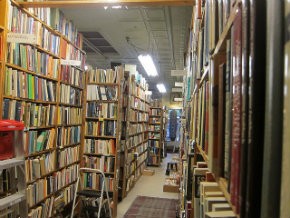A browser’s lament
First there was a Barnes and Noble, and then a Borders Bookstore moved into the neighborhood. Then after a while the Barnes and Noble dropped out, and we were left with one bookstore—until last year, when Borders went out of business. Now we are without a full-service bookstore, and life is hard.
My wife and I used to visit a bookstore at least once a week, often browsing for an hour or two after going out to dinner. We would wander the aisles separately, then eventually meet, compare our found treasures and head for the cashier.
When our daughter was younger and at home, she looked forward to these times as much as we did. As a toddler, in fact, she confused a bookstore with church. We attended (and still attend) St. Barnabas, and when someone asked her where she went to church, she answered, "St. Barnes and Noble."






